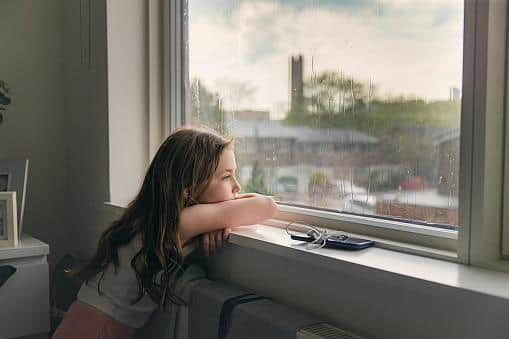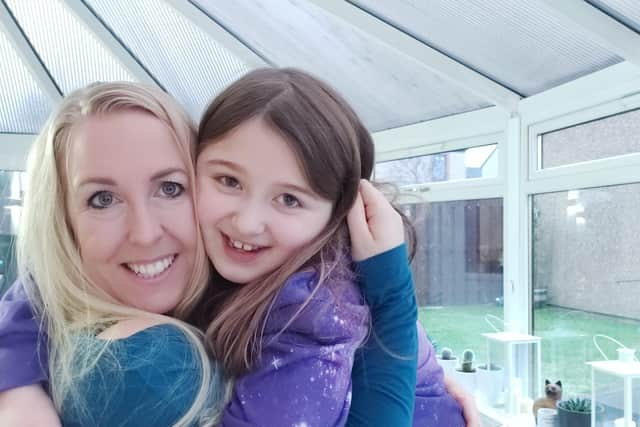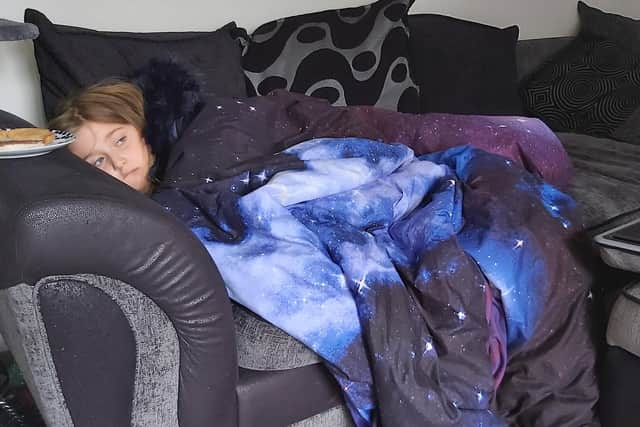Long Covid in children: 'It's been a struggle to be heard'
Jasmine has to make sure help is at hand when she goes up the stairs. Since being very sick after getting Covid, her mum Lois has often found her collapsed on the steps “like a dead weight”.
The teenager, from Tayport, suffered complications after getting the virus in August 2020 and the change in her was like “night and day”, said mum-of-four Lois.
Advertisement
Hide AdAdvertisement
Hide AdShe managed a part-time return to school last year but then tested positive for Covid again with worse symptoms.


Jasmine finally got an appointment with a paediatrician six months after being told by her GP it was “just fatigue”.
"Overnight Jasmine became so unwell and unsteady on her feet. The GP palmed us off, saying it was likely too much screen time,” Lois said.
“I had to push and eventually saw a paediatrician. We had one appointment. The paediatrician said there was nothing she could do for us.”
Later, Jasmine was discharged and advised she’d be “dealt with in the community” because school was the best place for her.


Jasmine is still suffering from debilitating symptoms which become more severe after even just a little physical activity. She is dizzy, nauseous, has difficulty swallowing, a racing heart and rashes. She has to rely on her mum for basic tasks.
Lois said: “We’re getting nowhere. Jasmine is essentially incapacitated, yet often made to feel like a fraud. One doctor did admit we’d been “short changed”.
“It's a very solitary life. She spends so much time lying down but doesn’t get restful sleep. She wants to be independent, do basic things like shower and wash her own hair without help.
Advertisement
Hide AdAdvertisement
Hide Ad“At first, the physio told us she thought long Covid in young people was a bit “out there”. Why can’t they see, no 16-year-old would want to be stuck at home all the time?”


Lois and her husband Mike are now home schooling their children Ruby, 10, Max, 8 and plan to home school Isaac, 5. The couple are setting up a catering business from home so they can manage Jasmine’s care.
The couple is frustrated at the lack of awareness and treatment to help Jasmine.
“I keep thinking of how it used to be. She’d go out and about herself. Now she’s in a wheelchair and feels very self-conscious going out,” Lois said.
“From the start we have been doing this blind. Doctors have no strategy for how to help Jasmine. But we’re trying to do what we can and wait, hoping she will get better.”
******************************
Jasmine is one of tens of thousands of children and young people in the UK who have developed long Covid, according to figures from the Office of National Statistics.
The post-viral condition can leave children wrestling with a range of symptoms including joint pain, respiratory issues, heart palpitations and rashes.
It is marked by severe and relapsing fatigue, neurological problems and in the most serious cases, it can lead to organ damage.
Advertisement
Hide AdAdvertisement
Hide AdIn the severity and range of symptoms, it resembles CFS/ME, which has gained increased recognition, but both can still leave medics at a loss as to how to treat children and young people.
The world’s largest research to date involving children, the Children & Young People with Long Covid (CLoCk) study, found a significant number remain affected even 15 weeks
after their infection.
Researchers at NHS Grampian are making progress on underlying mechanisms, which could lead to clues as to what treatments could be effective. So far they have identified autoimmune process that some people may be predisposed to, mast cell activation, and a process called micro-clotting.
But what we still do not know about long Covid is alarming.
Leading public health experts have warned it is underestimated, due to a lack of understanding of the post-viral condition among doctors. And there is no simple test.
Long Covid Kids Scotland, a charity supporting parents, said the condition is often disbelieved by medical professionals.
That urgently needs to change, says lead representative Helen Goss. Her daughter Anna, nine, has not recovered since she got Covid in 2020.
“Most are told it’s anxiety. Kids have many symptoms but like in adults, tests often come back normal. It is easily dismissed as psycho social. At one point, almost every family in the group has been told there’s nothing wrong with their child,” Helen said.
****************************
Advertisement
Hide AdAdvertisement
Hide AdDr Nisreen Alwan, Associate Professor in Public Health at the University of Southampton, fears it is even harder to access help since point testing has been scrapped.
Dr Alwan, a champion for Long Covid Kids Scotland, told Scotland on Sunday: “Long Covid in kids seems to be hidden but the data shows it’s a big problem. My concern is what happens if we don’t get confirmation of infection. This is so important. It will have an impact and will increase inequalities. Those who can pay will access tests.
“Even if families get test confirmation, they currently face difficulties getting a diagnosis.
“If you have the positive test result then you have that proof the child had Covid, then can see a timeline that the child has been unwell since. The first step is always recognition.
“Even if there is no specific treatment, diagnosis could help. Denial of problems becomes worse without it.”
An expert on child and maternal health, Dr Alwan added more evidence is needed on risk factors, how reinfection affects the condition and said it is crucial to encourage take-up of the vaccine among five to 12-year-olds.
Dr Alwan also wants to see a clinical definition and said it is vital children are not left behind in studies of post-Covid illness.
******************************
Even after a positive PCR and months of lingering symptoms many families have to fight to access services.
Advertisement
Hide AdAdvertisement
Hide AdLong Covid Kids is helping a family in Fife whose 13-year-old has been housebound for two years. The teen has not been able to get a wheelchair or school help. She was hospitalised after first infection and her condition has worsened since second infection, but her mum was told her daughter is “as good as she can be”.
Parents tell the group they face a lack of support at every turn, from healthcare to support or children falling behind with school work. Many give up work to look after their sick child.
Helen Goss says better data gathering could lead to proper help.
Her daughter Anna now spends most of her days on the couch. Unable to walk more than a short distance, she has to use a wheelchair.
Helen, from Westhill in Aberdeenshire, also has long Covid. At first the GP told her “kids don’t get long Covid”.
She said it is her worst nightmare not knowing when – or if – her child will get better.
She added: "Anna asks me when she is going to get better. She has crushing fatigue, headaches, ticks, nausea and also has developed anxiety and paediatric inflammatory multisystem syndrome (PIMS). We are prisoners in our own home. But we have had serious problems accessing healthcare. I’d be lost without the group for peer support.”
Anna was eventually given antibiotics and now does physiotherapy which can leave her “wiped”.
Advertisement
Hide AdAdvertisement
Hide AdLike Lois Marwick, Helen she was told other treatment was not available on the NHS so paid for private consultations.
Her headteacher visited Anna at home and was shocked by her decline in health. But after missing school for most of two years, she were denied one-to-one tutoring.
“One minute, Anna was engaged and chatting then she sunk into the sofa with droopy eyes,” said Helen. “The school finally understood how Anna’s life is unrecognisable now. She is unrecognisable.
“Kids are suffering. But nobody seems to be listening or care that much."
****************************
Last week, Heath Secretary Humza Yousaf issued the first £3m of the Scottish Government’s long Covid fund. In total, £10m will be allocated over three years and split between health boards to improve care.
Long Covid Kids Scotland said the “paltry” £3m is not enough and wants to see more funding for services, with some specifically for children.
A growing number of medics, charities and politicians have called for urgent investment to set up specialist clinics.
Researchers at NHS Grampian said clinics with specialist doctors were needed "urgently" despite the expense.
Advertisement
Hide AdAdvertisement
Hide AdIn England, the NHS has funded paediatric hubs with experts on respiratory problems and fatigue who treat youngsters in the round, advise family doctors and can refer them into other specialist services.
In Scotland, help is typically provided through rehabilitation-based physiotherapy, occupational therapy and psychological services.
The Royal College of General Practitioners claims this approach helps people “self-manage”, but Long Covid Kids argues children with more severe symptoms cannot “rehab” themselves better.
In some cases, exercise treatments could be actively harmful.
Helen Goss believes the danger to kids is that families feel they need to accept what they are offered, after a struggle to access a diagnosis or any services.
“Most are prescribed graded exercise which is about gradually increasing activity but it can be harmful for anyone with long Covid. There’s a lack of understanding of (post
exertion malaise), which leads to relapses or “crashes” after very little activity.
"Anna is wiped for days after sessions so she does physio in the car park to save her going into the building. She sometimes feels she has to push more than she can do.”
*****************************
Advertisement
Hide AdAdvertisement
Hide AdRetired paediatrician Nigel Speight believes getting a diagnosis of CFS/ME is the best hope for children and young people with long Covid.
Dr Speight, from Durham, is an expert on paediatric ME/CFS and for decades has supported parents whose children were misdiagnosed as having a psychiatric condition.
He has stopped children with the illness being removed from their homes after parents were wrongly accused of fabricated illness and has published papers advising doctors how to treat the illness.
His pioneering work in the UK has also informed research into the under-diagnosis of childhood asthma.
Dr Speight said: "Kids with long Covid are treated terribly. The failings of doctors on this is huge. Most still put it down to anxiety. The narrative that most children are fine and unaffected has been unchallenged. This puts parents in an impossible position, battling to be believed by healthcare practitioners and schools who often try to force children back. That doesn’t work.
"My view is that it’s better for the child to be diagnosed with CFS/ME and protected by updated NICE guidelines on that.”
Recently updated NICE guidelines for long Covid says “rehabilitation” should only happen after checking for symptoms that would need investigation and further research is recommended on exercise “interventions”.
But the guidance is not yet being implemented in Scotland.
Dr Alwan argues that diagnosis of CFS/ME is not the answer. She said: "It’s so variable, it depends on the GP and degree of knowledge they have. Parents end up doing their own research. People are desperate.
Advertisement
Hide AdAdvertisement
Hide Ad“We urgently need to get more evidence-based information to doctors as well as families. But I don’t think getting a diagnosis of CFS/ME is the answer. In fact, it could hinder access to proper physical investigations being done on the child.”
*************************
Not long after getting Covid, former competitive skier Lizzie Jelley was sleeping 18 hours a day. She had to be woken up to eat.
The 16-year-old went back to school part-time then got another viral infection last January. In the past year, she has only seen her friends three times.
Lizzie was eventually diagnosed with CFS/ME brought on by Covid, but she has been refused access to a services for that.
Her mum Amanda said: “We were told she could access the specialist clinic in Glasgow. But they said no, it would “open the floodgates” for people with long Covid. It’s ludicrous.”
Lizzie, from Huntley, has PoTS (Postural tachycardia syndrome), insomnia, hair loss and her mental health has deteriorated.
She gets physiotherapy which can see her symptoms worsen but Amanda, a former nurse, is scared to drop it – she worries her daughter could be abandoned by health services.
She said: “At first, I thought we were lucky to see a GP who had experience of glandular fever so understood post-viral symptoms. He said she’d be back to “normal” in a couple of months.
Advertisement
Hide AdAdvertisement
Hide Ad“They don't get it. Just because Lizzie can do 10 minutes physio one day doesn't mean she could do 15 the next. The physio gave us bad advice and got annoyed when
Lizzie couldn’t manage a session because she was too ill. She felt she had failed or wasn't trying hard enough so always tried to push beyond what she could do.
“I don’t want to let go of the physio because accessing any service at all has been impossible.”
Desperate for help, Lizzie tried hyperbaric oxygen therapy, a treatment for decompression sickness, which has provided some relief.
But a few days before her exams started last month, Lizzie was admitted to hospital for the second time in two weeks with problems breathing. Doctors say they do not know what is causing it.
**********************
Like all the families I talked to, Amanda has sought advice privately from several experts and even went to Dubai for cardiology consult.
Meanwhile, Lizzie is still facing long waits for services like occupational therapy and Child and Adolescent Mental Health Services.
She is now being seen by a neurologist but her mum feels her only hope is to pay privately for oxygen therapy.
Advertisement
Hide AdAdvertisement
Hide AdLizzie is devastated at missing out on school work. She struggles to concentrate and is exhausted and “grey” after doing lessons but has been refused extra time for exams and tutoring.
Amanda said: “It’s an achievement if she does exams. My daughter was very academic. It’s so unfair. I am being her doctor, her nurse, her carer and her best friend. I just want to be her mum again."
“We can't do much, sometimes I take her out for a walk in her wheelchair. But we never give up on her. And that gives her some reassurance.”
The toll the condition takes on children and their families is huge.
For Long Covid Kids, the worry is that without robust research and increased investment in training and services, children will be left behind.
Helen Goss said: “We need better pathways for care as well as more support for education and for parents to work part-time or flexibly.
“Kids with long Covid can’t advocate for themselves so it's been a struggle to be heard. Healthcare professionals and support services need to know how to spot long Covid and properly support kids. They also need trained on what not do to.
“Long Covid is devastating and robs children of so much. Please, help us.”
Advertisement
Hide AdAdvertisement
Hide AdLizzie said: "I don’t know if I will be able to ski again. Everywhere I turn I think, “okay now I will get help”. But then it’s denied that I’m sick. It’s like I'm a shadow.
"Most of my friends are online after school but I’m usually already in bed by then. I feel lonely. When I think about the future now it’s hard not to be scared. Unless things change, I think we will be forgotten.”
Comments
Want to join the conversation? Please or to comment on this article.